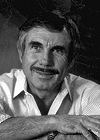A Biography of Logan Wright Jr.
A brief biography of Logan Wright Jr., after whom the Logan Wright Distinguished Research Award was named, is provided.
By Anne E. Kazak and Michael C. Roberts, PhD
 The Society of Pediatric Psychology (SPP) Board of Directors recognizes the contributions of its members with annual awards for accomplishments in research, service and mentoring and has one award specifically designated for an early career pediatric psychologist. The Distinguished Research Contribution in Pediatric Psychology Award, first given in 1986 to John Spinetta, was renamed the Logan Wright Distinguished Research Award after Wright’s death.
The Society of Pediatric Psychology (SPP) Board of Directors recognizes the contributions of its members with annual awards for accomplishments in research, service and mentoring and has one award specifically designated for an early career pediatric psychologist. The Distinguished Research Contribution in Pediatric Psychology Award, first given in 1986 to John Spinetta, was renamed the Logan Wright Distinguished Research Award after Wright’s death.
Logan Wright, Jr. (1933-1999), born in Wellington, Kansas, attended Oklahoma Baptist University on a track scholarship where he set state records for the mile. He received a master’s degree in religious education from Golden Gate Seminary in Berkley, Calif., and a PhD from Vanderbilt University in clinical psychology in 1964. He completed his internship at the University of North Carolina and started his academic career at Purdue University prior to moving to the University of Oklahoma Health Sciences Center (Oklahoma Children’s Memorial Hospital) where he spent the majority of his career in the Department of Pediatrics.
Along with Dorothea Ross and Lee Salk, Wright was one of SPP’s founders (Magrab, 1989). He was the first president of SPP (1969-1970) and is often referred to as the father of pediatric psychology. He wrote several conceptual papers that argued for the importance of this then emerging field (Wright, 1967, 1976) and was among the first to show that behavioral interventions could have important effects on pediatric care (Wright, Nunnery, Eichel, & Scott, 1968; Wright, Woodcock, & Scott, 1969). He also was among the first to assess psychosocial sequelae of physical illnesses (Wright, 1972; Wright & Jimmerson, 1971). The Encyclopedia of Pediatric Psychology (Wright, Schaefer & Solomons, 1979) was a trusted resource for trainees in the 1980s with its succinct summary of problems and treatments for 114 problems seen clinically (from abortion to weaning).
In an early paper in the American Psychologist (Wright, 1967), Wright grappled with distinguishing pediatric psychologists working in medical settings from psychologists in psychiatric clinics. He wrote, “The psychologist who is insensitive to the altered requirements of pediatric circumstances, or who is too inflexible to change his role, may wind up like a kind of refrigerator salesman among Eskimos: most pediatricians will resist his offerings and the buyers remain bewildered as to just why their purchase was necessary” (p. 323). He called for steps that would delineate the role of the pediatric psychologist, provide focused training to fit this role and argued for building a body of knowledge for pediatric psychology.
For those interested in learning more about Logan Wright, two obituaries are important resources. Former mentee and colleague Diane Willis wrote an In Memoriam describing Wright’s many facets, including his activities as APA president in the mid-1980s and his role in developing other organizations to further advance psychology (Willis, 2000). As Willis notes, he made a commitment to “giving psychology away” by making psychological knowledge as widely available as possible. Along these lines, he wrote a book for lay readers entitled Parent Power (Wright, 1978).
In addition to his activities as a psychology leader, Wright was involved in the early days of the Sonic Drive-In restaurants and owned 66 franchises across the South and Southwest. An obituary in the APA Monitor describes him as a “lone ranger,” noting that he was an energetic, hard-driving pioneer who “saw not only what was, but what could be.”
Providing an award for research accomplishment in pediatric psychology in honor of Logan Wright clearly provides an ongoing remembrance of Wright’s many contributions and his remarkably enduring insights into essential elements of pediatric psychology.
History Humor
A Pediatric Psychology Trivial Pursuit game at the 1987 North Coast Conference in Cleveland included the following question: Why is Oklahoma City considered the “encopresis capitol of the nation?” Answer: Because that is where Logan Wright and Gene Walker devised treatments and extensive consulting for successful treatment of encopresis (Wright & Walker, 1976, 1978).
References
Logan Wright Jr.’s obituary. (1999, December 21). NewsOK, May 14, 2013.
Magrab, P. (1989). Recollections: A publication of the Society of Pediatric Psychology, May 14, 2013.
Volz, J. (2000). Lone ranger: Logan Wright. Monitor on Psychology, Retrieved May 14, 2013.
Willis, D. (2000). In memoriam: Logan Wright, Jr., PhD. Journal of Pediatric Psychology, 25 , 359-361.
Wright, L. (1967). The pediatric psychologist: A role model. American Psychologist, 22 , 323-325.
Wright, L. (1972). Intellectual sequelae of Rocky Mountain spotted fever. Journal of Abnormal Psychology, 80 (3), 315-316.
Wright, L. (1976). Psychology as a health profession. Clinical Psychologist, 29 , 16-19.
Wright, L. (1978) Parent Power: A guide to responsible child rearing . New York: Psychological Dimensions.
Wright, L., & Jimmerson, S. (1971). Intellectual sequelae of hemophilus influenzae meningitis. Journal of Abnormal Psychology, 77 (2), 181-183.
Wright, L., Nunnery, A., Eichel, B., & Scott, R. (1968). Application of conditioning principles to problems of tracheostomy addiction in children. Journal of Consulting and Clinical Psychology, 32 (5), 603-606.
Wright, L., Schaefer, A., & Solomons, G. (1979). Encyclopedia of pediatric psychology. Baltimore: University Park Press.
Wright, L., & Walker, C. E. (1976). Behavioral treatment of encopresis. Journal of Pediatric Psychology, 4 (1), 35-37.
Wright, L., & Walker, C. E. (1978). A simple behavioral treatment program for psychogenic encopresis. Behaviour Research and Therapy, 16 (3), 209-212.
Wright, L., Woodcock, J., & Scott, R. (1969). Conditioning children when refusal of oral medication is life threatening. Pediatric Research, 3 , 275-278.
